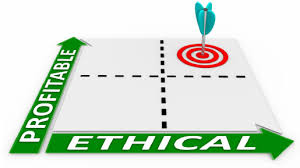Ethics, Profits, Sustainability and Stakeholders: An Update on a Familiar Relationship

And now we return to a familiar theme with some important updates – I always start with the simple proposition: ethical companies perform better over the long run; that does not mean that ethical companies will always be profitable, but it does mean that ethical companies will perform better than they would otherwise perform.
Some call this the ethical advantage or the ethical premium. I like to call it good old common sense. There is a growing body of research in this area confirming this connection between ethics and performance. I have cited this in earlier postings. (Here).
An interesting report in this area has been developed by JUST U.S. Large Cap Equity ETF (JUST). (Here).
Each year JUST capital conducts a survey on what it defines as ideal criteria for companies, focused on worker pay, well-being, customer treatment, privacy, beneficial products, environmental impact, job creation, strong communities and ethical leadership. The survey considers 80 items of information about each company and then ranks the companies. JUST created a index consisting of 428 companies and compared the performance of these 428 companies to the Russell 1000 companies over the period 2007 to 2018.

Lo and behold, the JUST index companies return was nearly 2 percent higher than the Russell’s 1000 listing (10.4 percent to 8.7 percent). Additionally, the JUST companies delivered a 7 percent higher return on investment over the last five years than the Russell 1000 companies not included in the JUST Index.
Many continue to criticize and seek reform of our current financial reporting scheme and the obsession with quarterly financial reports. Some have suggested that this short-term perspective leads to short-sighted definition of business “success.”
Measuring a company’s profits requires a long-term perspective. But what do we mean by that? A three-month period, or quarter, is certainly not an accurate barometer of financial success. It takes time (and money) to invest in new products and services, implement a new competitive strategy, seek a competitive advantage in the market, or respond to consumer demands.

This is where ethical decision making or ethical business leadership can play a role. Applying this construct, ethical business leaders may ground themselves by weighing all stakeholders’ interests (of which shareholders are one). Business leaders have to understand the context in which they operate and understand that they have stakeholders that are not just shareholders. A company has a social contract that encompasses society and the community in which it operates.
At the same time, a short-term, quarterly perspective, forecloses consideration of efforts that require a longer time to materialize. Sometimes companies employ a more refined weighing of strategies that may bear fruit over a longer time period.
How does a company establish a positive image over the long term? There are a number of relevant factors, one of which is the company’s fair and honest treatment of customers and employees. When consumers look for an industry leader and potential employees are considering employment opportunities, companies with ethical reputations and business practices are likely at the top of the list.
Shareholders consist of individuals and institutions that own company stock. Corporate boards and managers should not solely focus on immediate shareholder needs or input because responsible management includes long-term competition and sustainable growth.

A simple but helpful exercise is to create a page with three columns: the first consists of a list of all stakeholders in priority (e.g. shareholders, employees, vendors/suppliers, customers); the second includes a list of each stakeholder’s interests and goals; and the third column lists the likely impact of a business decision on each stakeholder.
A company’s intangible positive support is often referred to as “goodwill,” i.e. the business’s reputation, its brand name, its workforce attitude, and the loyalty of its customer base. The ethical performance of the company, its managers and its employees will increase the value of these components. The company’s culture consists of shared beliefs, values and behaviors that create an internal environment within which managers, employees, and other stakeholders interact.
In this context, it is easy to see that a long-term view of business success is critical for accurately measuring profitability. If the company’s stakeholders benefit from ethical conduct, increasing goodwill and profitability, the perspective of stakeholders will positively turn to longer-term and sustainable growth strategies.














